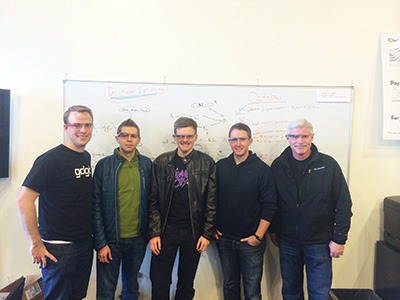“We’re working with hardware partners such as Vuzix, Recon and VSP Global to advance the smart glasses space,” said Fink. (Vuzix is a leader in video eyewear technology, Recon develops athlete-focused smart glasses, and VSP Global’s “The Shop” is an eyewear design and think tank.)
OTG’s technology uses the front-facing camera on smart glasses to intuitively control the device, based on simple gestures such as making a thumbs-up motion or a horizontal swipe of the hand. OTG has designed its technology platform to include head tracking and power management, support for Bluetooth protocol and a user interface that enables the technology to run on all Android-based devices – providing a universal user experience regardless of hardware.
To begin with, the company focused on developing a smart glasses application called Ghost Runner (see sidebar). But while developing the tools and code libraries for that app, Fink and Milam quickly realized that a larger need existed – a software platform for a wide variety of smart glasses apps.
“We started as a sports app company, and because of our relationship with Vuzix and how much we learned, we transitioned to software platform development,” explained Milam “That will be a much broader focus – get the glasses and software platform running first, then put apps on it.”
“Our platform will accelerate the market for smart glasses,” said Fink.
OTG’s strategy is to develop long-term licensing agreements with several hardware OEMs, as well as with smart glasses app developers – who will soon be able to access a www version of OTG’s software platform.
Early in January, OTG received $700,000 in funding – a good portion of it from the first-ever Foundry Group AngelList Syndicate Fund, which amalgamates funding from investors with modest amounts to invest. This funding, said Fink, has enabled them to hire two more software engineers, bringing the total team to eight – five of which are engineers. The expanded team will allow the firm to release a www of their technology within 90 days.
The future beckons
Just as their software platform removes barriers between users, mobile apps and smart glasses, Fink and Milam see their company as part of the solution to regional economic barriers.
Milam, who also co-owns Cascadia Women’s Clinic in Vancouver with his wife, has been a member of Identity Clark County for 16 years, currently serving as board chairman.
“We need to stand united as a region, which includes Portland, to promote infrastructure and growth,” said Milam. “We need to break down barriers and borders (it’s a narrow river, really!).”
For example, Fink said one of the reasons OTG is located in Portland is because it’s easier to attract senior-level software engineers there, compared to Vancouver. However, he added, “we see Vancouver has been making a lot of steps to improve the technical community.”
Milam said that he has previously participated in discussions between the Portland Seed Fund (PSF) and the Columbia River Economic Development Council, regarding the possibility of duplicating the PSF model, or maybe adding a Southwest Washington location.
Milam, who has lived in Clark County for 30 years, and Fink, who was born and raised in Vancouver, see the city’s recent attainment of the Innovation Partnership Zone (IPZ) designation as an important step in the right direction.
“The IPZ will help accelerate Vancouver’s tech scene exponentially,” Fink said, “and we’re excited to be part of that.”
Sandra Towne, the manager of planning and policy for Vancouver’s Community and Economic Development department, called the IPZ designation a “shared event [with Portland],” and said downtown Vancouver is “becoming much more like what smaller innovatives and creatives are looking for, with coffee shops, good restaurants and an urban feel.”
“The IPZ could put our community on the map,” stated Milam.
In the meantime, OTG is moving ahead with patents both for the software platform and for their Ghost Runner app, and expects to do a series-A funding round in six to ten months, enabling them to release final products in the third quarter of 2014.
“We’re really excited about moving this space forward,” said Fink. He, along with Milam, sees wearables – especially eye wear – being the “post-smartphone era.”
Virtual running partner Who hasn’t wished for an exercise partner, who can provide encouragement and motivation? OnTheGo Platforms Inc. has an app that does just that. About four years ago, Ryan Fink – a Vancouver native – found himself running the same route near Skyview High School (from which he graduated) every day, but wondering where he sped up or slowed down. He envisioned an app, running on smart glasses, that would display a virtual runner, who challenges you to run faster. Partnering with smart glasses OEM Vuzix, OTG has developed and patented the Ghost Runner app. Much of the www testing, said Fink, was done on the “cool trails” surrounding the Washington State University Vancouver campus. Using the software platform also developed by OTG, Ghost Runner supports hand gestures that let joggers naturally interact with their smart glasses – and better their game. |
{jathumbnail off}




